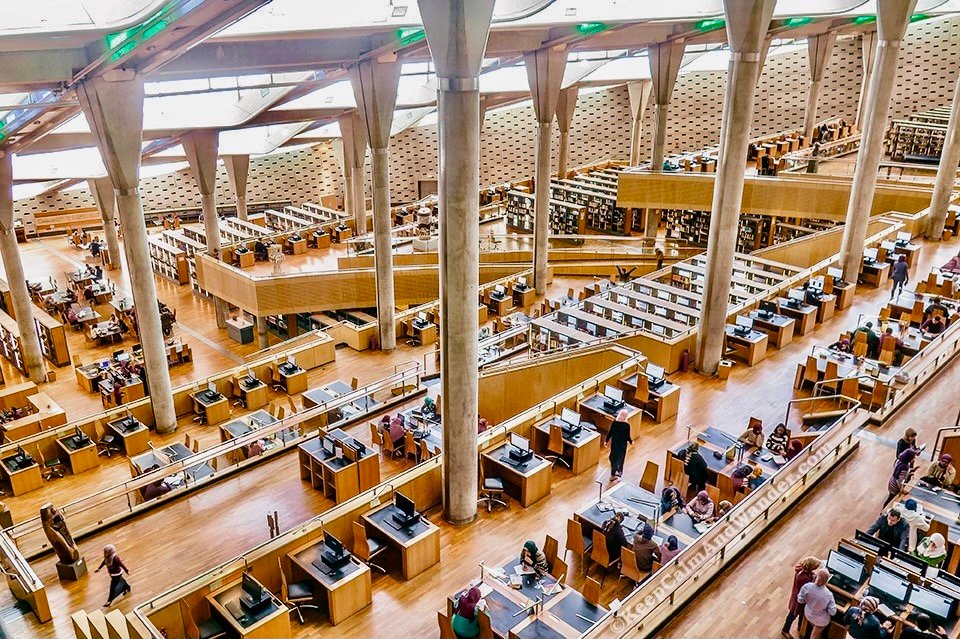Last Updated on 1 month ago by Michael William
Introduction
The Alexandria Library, also known as the Library of Alexandria, is an iconic symbol of knowledge and intellectual advancement. For centuries, it has been a beacon for those seeking to expand their understanding of the world around them. Located in the Egyptian city of Alexandria, this ancient institution was once home to some of history’s greatest minds and served as a hub for learning and research. In this article.
We take a closer look at 10 fascinating facts about the Alexandria Library that will help us better appreciate its rich history and legacy. From its founding by Ptolemy I Soter in 295 BC to its destruction by Julius Caesar during his conquest of Egypt in 48 BC, the story behind the Alexandrian library is one full of interesting details that have helped shape our modern world today!

1. Origins of the Alexandria Library
The Alexandria Library was established in the 3rd century BCE by Ptolemy I Soter, one of Alexander the Great’s generals. It was a major component of the larger research institution known as the Mouseion, which was dedicated to the Muses – the nine goddesses of the arts and sciences in Greek mythology.
2. The Largest Collection of Knowledge in the Ancient World
The Alexandria Library was a remarkable achievement of the ancient world and is renowned for its vast collection of scrolls. At its peak, it was believed to house over 500,000 scrolls, which included works on philosophy, mathematics, astronomy, and medicine, making it the largest repository of knowledge in antiquity. Scholars from various disciplines flocked to the library to study these texts in detail and make use of this incredible resource. The legacy left by the Alexandria Library continues today as a testament to how far human knowledge can reach when we work together towards a common goal.
Choose your Next Cheap Tour To Egypt The Price Starts From $50

3. The Destruction of the Alexandria Library
The exact cause and timeline of the Alexandria Library’s destruction remain a subject of debate among historians. Some attribute its demise to a fire during Julius Caesar’s invasion of Alexandria in 48 BCE, while others believe it was destroyed during the reign of Emperor Aurelian in the 3rd century CE. Regardless of the cause, the loss of the Alexandria Library marked a significant blow to the intellectual heritage of humanity.
4. The Scholars of the Alexandria Library
The Alexandria Library was a beacon of knowledge and learning for the ancient world. It attracted some of the most renowned scholars, including Euclid, Eratosthenes, and Hypatia who all made significant contributions to their respective fields. Euclid’s works on geometry laid down many foundations that still form part of modern mathematics today; Eratosthenes’ map-making techniques revolutionized geography, while Hypatia’s philosophical writings provided new insights into ethics and religion. Each scholar left an indelible mark on academia that continues to be felt centuries later.
Visit the Bibliotheca Alexandrina and enjoy a fresh seafood lunch on the Mediterranean.
5. The Translation of Hebrew Scriptures
The Alexandria Library was the site of one of the most significant projects in ancient history: the translation of Hebrew Scriptures into Greek, known as the Septuagint. This project was instrumental in making these sacred texts more accessible to a wider audience and ultimately contributed to spreading Judaism and Christianity throughout the Mediterranean region. The impact this translation had on religious thought is undeniable; it allowed for new interpretations that would otherwise have been impossible without its existence. As such, this project remains an important part of both Jewish and Christian heritage today.

6. The Serapeum: A Daughter Library
The Serapeum was a smaller library and temple complex built to honor the god Serapis. Often referred to as a “daughter library,” it housed a portion of the Alexandria Library’s extensive collection of scrolls, ensuring their preservation and accessibility for future generations.
7. The Lighthouse of Alexandria
The Lighthouse of Alexandria, also known as the Pharos, was an iconic structure in the city. Standing approximately 450 feet tall, it was one of the tallest structures in the ancient world and served as a guiding beacon for ships entering its harbor. Not only that, but it is also considered to be one of the Seven Wonders of the Ancient World due to its impressive height and grandeur. It has been said that this lighthouse helped guide many sailors safely through their travels over centuries until it eventually fell into ruin around 1400 AD due to earthquakes and other natural disasters.
8. Reviving the Legacy of the Alexandria Library
In 2002, the Bibliotheca Alexandrina was inaugurated as a modern-day embodiment of the ancient Alexandria Library. This state-of-the-art institution aims to recapture the spirit of intellectual curiosity and cultural exchange that defined the original library.
9. The Mystery of the Lost Works
The destruction of the Alexandria Library is a tragedy that continues to haunt historians and scholars even today, due to the loss of many invaluable texts. Among these were works by Aristotle on comedy and drama, as well as those from ancient mathematicians and philosophers – all lost forever. This serves as a powerful reminder of how important it is for us to preserve our intellectual heritage; without this protection, we risk losing more irreplaceable manuscripts in future generations.
10. The Influence of the Alexandria Library on Modern Libraries
The Alexandria Library set a precedent for libraries throughout history, inspiring the creation of countless institutions dedicated to the collection and dissemination of knowledge. From the Library of Pergamum in ancient Greece to the modern-day Library of Congress in the United States, the legacy of the Alexandria Library continues to influence the role of libraries in society.
Conclusion
The Alexandria Library stands as a testament to humanity’s relentless pursuit of knowledge and intellectual growth. As we’ve explored in this article, this ancient institution was a beacon of learning and culture in the ancient world, attracting scholars from various fields and housing an unparalleled collection of knowledge. Although the physical library is long gone, its legacy lives on through modern-day institutions like the Bibliotheca Alexandrina and the countless libraries inspired by its example. By delving into the history and impact of the Alexandria Library, we gain a greater appreciation for the importance of preserving and sharing our collective wisdom for future generations.

